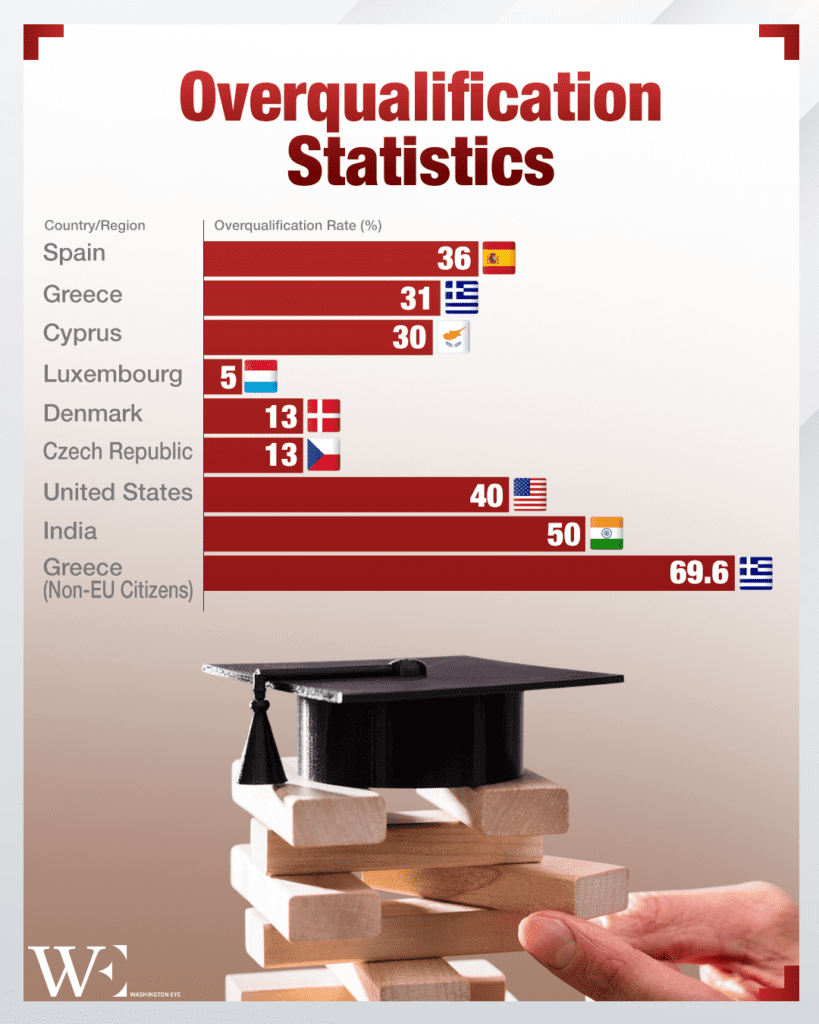In today’s competitive job market, many individuals find themselves trapped in roles that do not align with their qualifications and expertise. Despite holding advanced degrees and specialized skills, countless professionals are forced to accept positions that require far less than their full potential. This growing trend of overqualification not only affects individuals but also signals inefficiencies in economies struggling to match talent with opportunity. Recent data highlights the extent of the issue, with some countries experiencing alarmingly high rates of overqualification. Spain leads with 36% of its workforce classified as overqualified, followed closely by Greece at 31% and Cyprus at 30%. In contrast, Luxembourg boasts the lowest rate at just 5%, while Denmark and the Czech Republic each stand at 13%. These figures underscore stark disparities in labor market efficiency across Europe, revealing how economic structures and policy decisions contribute to mismatches between education and employment.
Globally, overqualification is not confined to Europe. In the United States, a similar trend is evident, with nearly 40% of college graduates working in jobs that do not require a degree. This issue is particularly acute in fields such as retail, hospitality, and administrative roles, where college-educated individuals are increasingly taking up positions that historically did not require higher education. In emerging economies such as India and Brazil, the situation is even more pronounced, with rapid growth in the number of university graduates but limited job creation in sectors that can absorb this talent. In India, more than 50% of graduates are estimated to be underemployed, a stark indicator of the country’s struggle to match its highly educated youth with suitable jobs.
Economic disparities between regions further exacerbate the issue. Countries and cities with concentrated professional services offer better employment prospects for skilled workers, whereas regions with weaker job markets experience higher rates of overqualification. London, for example, provides more opportunities for graduate-level employment than many other parts of the UK. Similarly, in countries with fragile economies or high youth unemployment, overqualification becomes a survival strategy rather than a choice, pushing workers into positions well below their capabilities.
Challenges Faced by Immigrants
For immigrants, the challenge is even greater. The lack of recognition for foreign qualifications leaves many highly skilled professionals underemployed in host countries. In Greece, 69.6% of non-EU citizens are overqualified for their jobs, the highest rate in the European Union. This not only prevents individuals from contributing fully to their new societies but also represents a massive loss of potential for the economy. The inability to integrate skilled migrants into appropriate roles fuels social frustration, wage stagnation, and even brain waste, a situation where highly educated individuals are unable to apply their skills effectively.
Steps to Resolve the Issue
Addressing this issue requires coordinated efforts between governments, educational institutions, and industries. One crucial step is realigning educational programs with market needs to ensure graduates are equipped with skills that match current job opportunities. This can be achieved through greater collaboration between universities and employers, fostering curricula that prepare students for actual workforce demands rather than generic academic excellence. Additionally, governments must invest in regional economic development to create high-skilled job opportunities beyond major metropolitan areas. Encouraging businesses to expand in smaller cities and offering incentives for startups can help distribute employment opportunities more evenly, reducing the overqualification burden in concentrated job markets.
For immigrant workers, simplifying the recognition of foreign qualifications is essential to ensuring that skilled professionals can contribute effectively to the economy. Many countries impose complex and time-consuming processes for degree recognition, forcing highly educated migrants to take up jobs far below their expertise. Streamlining these procedures, offering bridging programs, and providing professional accreditation pathways can help integrate skilled workers into appropriate roles, maximizing their potential.
Lifelong learning and upskilling initiatives also play a critical role in reducing overqualification. As industries evolve and new technologies emerge, workers must continuously adapt their skills to remain competitive. Governments and businesses should invest in reskilling programs that allow employees to transition into more suitable positions rather than being trapped in jobs that do not fully utilize their capabilities. Encouraging flexible learning opportunities, vocational training, and employer-sponsored development programs can help bridge the gap between education and employment.
Overqualification is not just a personal struggle but a systemic issue that reflects inefficiencies in labor markets worldwide. When highly skilled workers are unable to secure roles that match their expertise, economies lose out on innovation, productivity, and potential growth.
















